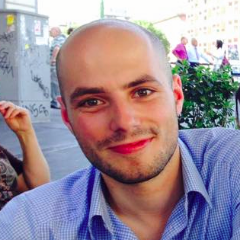When we enter the 17th-century Teatro Farnese, the orchestra is already playing the overture. Eyes are greeted with banners running along the gradines proclaiming the sanctity of the family on the one hand, and of women's rights on the other. Stalls have been emptied of seating to create an empty space for the audience to roam. Graham Vick, whose new production of Stiffelio opened at Parma's Verdi Festival, wastes no time in introducing us to the director's operatic deconstruction.
Conductor Guillermo García Calvo leads the orchestra on one side of the stage, his image beamed around the auditorium via television screens to allow for coordination with the principals. Most of the latter perform from mobile platforms manoeuvred through the stalls into various formations. Press releases had warned that audience members would be required to move too, and to find their own perspectives – both visual and moral – not just as spectators but as self-investigating participants.
If that sounded lofty on paper, it worked powerfully in practice. Vick blurs the boundary between observer and observed expertly, so that apparent members of the audience turn out to be members of the chorus, or actors that brandish bibles and crosses, have epileptic fits and cower under platforms as Stiffelio issues dramatic proclamations. Were the two male lovers I walked past punters or actors? Without recourse to virtual reality or hallucinogens, Vick has created a suggestive, vividly surreal world where one's reference points are lost to the wind.
That Vick himself oversees the operation, his face flashing up concern whenever it looks like a platform might collide with someone, is significant. This is, after all, intended as an operatic experience in which each of us gets our hands dirty. Francesco Maria Piave's strikingly progressive libretto, about a priest that threatens to divorce his adulterous wife, mirrors the personal experiences of Verdi, whose lover – soprano Giuseppina Strepponi – was ostracised by the Busseto community when she began to live with the composer outside of wedlock. Modern touches in Vick's production, including a homosexual couple at the start to Act 2 brutally beaten by church officials, make the work freshly challenging and invite us to take personal standpoints. If Stiffelio represents Verdi, then we are members of the Busseto community.
Importantly, the central story is powerfully and clearly told. Tenor Luciano Ganci gives a nuanced and layered reading of Stiffelio, and is especially effective as the psychologically fraught vicar torn between fulfilling his spiritual duties and wallowing in anguish when called on to deliver a sermon soon after discovering his wife's infidelity. The rich-voiced soprano Maria Katzarava's erotically-charged Lina made it easy to believe in the magnetic power the character exerts over the priest. Using her sexuality to bend him to her will while begging for forgiveness made for a piquant mix of religion and carnality. Giovanni Sala played the passionate stud as Lina's lover Raffaele, though was reduced to a quivering wreck before being murdered by the steely-voiced Francesco Landolfi as Lina's father Stankar.
That there were some musical imperfections, namely malcoordination with the distant orchestra, hardly mattered. Vick's ambitious production allows Verdi's voice to speak with special authenticity. For Parma's Verdi Festival – commonly regarded as the protector of the composer's legacy – it stands as nothing short of a coup.




